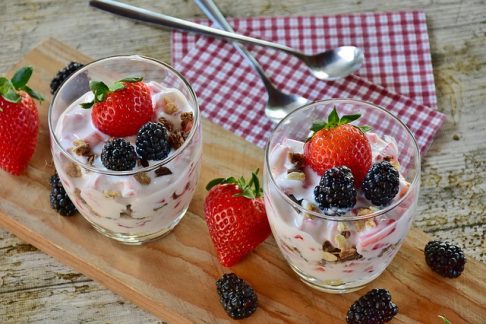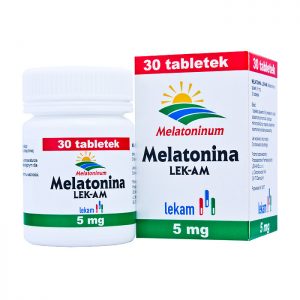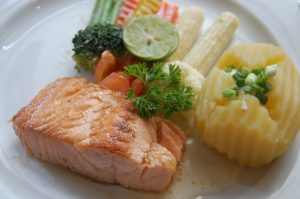What diet for insomnia?


Last modified: 21-09-2021
By entering “insomnia diet” or “food for insomnia” on Google, you can find a lot of advice: lots of carbohydrates and little protein, omega-3 fatty acids, fish, milk, almonds, walnuts, honey sandwiches, cheese, cabbage … and what does scientific research say about it? As it turns out after reviewing them, not much …
Although both diet and sleep play an important role in daily functioning and health, the research published so far does not clearly show what you need to eat to sleep well. Many publications indicate that people who sleep less get more calories from fat and refined (processed) carbohydrates, and eat fewer vegetables and fruits than people who sleep longer. At the same time, they eat meals at irregular times and eat snacks more often. However, it is unclear whether unhealthy eating leads to sleep problems and insufficient sleep length, or whether people who sleep too short do not have the time, strength or the will to eat healthy.
Some studies also show conflicting results. This includes, for example, eating fat in the diet and drinking milk at bedtime.
Theoretically, B vitamins and magnesium may have an impact on the quality of sleep. They are involved in the synthesis of serotonin and melatonin, which play an important role in the regulation of the sleep-wake cycle. Indeed, some studies indicate their beneficial effects, but rather this only applies to people who have their deficiencies.
Research also shows that what could theoretically be beneficial is not necessarily the case. Cornu et al. (2010) investigated the effect of a dietary supplement containing polyunsaturated fatty acids and hops extract on sleep quality in 101 people struggling with moderate or severe sleep disorders. Polyunsaturated fatty acids (linolenic and linoleic acid) are involved in the synthesis of melatonin, while hops extract slows down the metabolism of some substances, including melatonin, so it should be available in the body longer. Even so, it turned out that taking this supplement was no more effective than a placebo, and it did not affect either subjective or objective indicators of sleep quality.
Two reviews of research on the effects of diet on sleep have been published in recent years: in 2012 (Peuhkuri et al.) and in 2016 (Knowlden et al.). The authors of both studies pointed to the same shortcomings – most of the research on the role of nutrition in sleep quality was conducted on very small groups of subjects, usually people who did not have any sleep problems, moreover, different methodology and methodological shortcomings make it difficult to compare the results of the research.
There are, however, a few studies worth paying attention to. These include Hudson et al. (2005) who studied the effects of tryptophan in 49 people with chronic insomnia. Tryptophan is a protein amino acid present in large amounts, incl. in egg white, fish (cod, salmon), soybeans, pumpkin seeds, sunflower seeds, sesame seeds, cheese, meat. It is involved in the production of serotonin and melatonin, and previous studies have already shown that taking pure tryptophan in doses of 250 – 1000 mg has a beneficial effect on sleep.
To achieve such a result, however, it is not enough to just eat a lot of protein. High protein intake in food causes blood levels of tryptophan to rise, but to decrease in the brain. This is because tryptophan competes with other amino acids on its way to the brain, such as tyrosine, valine, isoleucine, leucine, and phenylalanine (so-called large neutral amino acids, LNAAs). Since most proteins contain a relatively small amount of tryptophan compared to other amino acids, it loses to them and cannot cross the blood-brain barrier. Insulin comes to the rescue, as it lowers the blood level of all amino acids except tryptophan. Thus, it increases the ratio of tryptophan to other amino acids and helps it reach the brain. Eating enough carbohydrates to increase insulin levels can therefore have an effect on tryptophan levels in the brain.
The authors of the study wanted to check whether food can achieve the same effect as taking 250 mg of pharmaceutical tryptophan. For a week, 1.5 hours before going to bed, the study group consumed a bar containing 25 g of defatted pumpkin seeds and 25 g of sugar – dextrose. They found that the subjects achieved the same improvement in sleep quality as the group that took the pharmaceutical tryptophan bars.
Markus et al. (2005) also studied the effects of tryptophan on sleep quality, but used alpha-lactalbumin to increase its levels in the brain. It is a milk-derived protein that is extremely high in tryptophan compared to other amino acids. The study participants were 14 people with sleep problems and 14 people without sleep disorders. In the evening, they consumed a milk drink enriched with alpha-lactalbumin or a placebo, and then their sleepiness and attention processes were measured. It turned out that both in people who sleep well every day and in those who sleep poorly, the consumption of alpha-lactalbumin did not increase sleepiness in the evening, but reduced sleepiness in the morning. In addition, in people who complained of sleep problems, the alpha-lactalbumin drink positively influenced their reaction time in a study conducted the next morning.
Kiwi consumption can also benefit people with insomnia, although more research is needed to confirm this. Kiwi fruit is rich in antioxidants, flavonoids, carotenoids, anthocyanins, vitamin B9 and melatonin. All these ingredients can theoretically have a positive effect on sleep. In 2017, Nødtvedt et al. studied the effect of this fruit in 74 people struggling with chronic insomnia. Participants in the study consumed 130 g of kiwi or pears in the control group every day for 4 weeks one hour before going to bed. Objective measures measured with an actigraph (movement meter) did not improve, but subjective indicators – sleep quality and daytime function measured by sleep logs – did increase.
Undoubtedly, food ingredients can affect the quality of sleep and be helpful in the treatment of insomnia. However, despite the fact that many studies have been carried out on this subject, there are still no valuable publications that would clearly indicate what and in what amounts to eat in order to sleep well.
References
- Cornu C., Remontet L., Noel-Baron F., Nicolas A., Feugier-Favier N., Roy P., Claustrat B., Saadatian-Elahi M., Kassaï B. (2010). A dietary supplement to improve the quality of sleep: a randomized placebo controlled trial, Complementary and Alternative Medicine, 10:29, 1-9. (text at biomedcentral.com)
- Hudson C., Hudson S., Hecht T., Mackenzie J. (2005). Protein source tryptophan versus pharmaceutical grade tryptophan as an efficacious treatment for chronic insomnia, Nutritional Neuroscience, 8(2), 121-127. (pdf at zenbevonline.com)
- Knowlden A., Hackman C., Sharma M. (2016). Systematic Review of Dietary Interventions Targeting Sleep Behavior, The Journal of Alternative and Complementary Medicine, 22(5), 1-14. (pdf at researchgate.net)
- Markus C., Jonkman L., Lammers J., Deutz N., Messer M., Rigtering N. (2005). Evening intake of alpha-lactalbumin increases plasma tryptophan availability and improves morning alertness and brain measures of attention, The American Journal of Clinical Nutrition, 81(5), 1026-1033. (text at oup.com)
- Nødtvedt Ø., Hansen A., Bjorvatn B., Pallesen S. (2017). The effects of kiwi fruit consumption in students with chronic insomnia symptoms: a randomized controlled trial, Sleep and Biological Rhythms, 15, 159-166.
- Peuhkuri K., Sihvola N., Korpela R. (2012). Diet promotes sleep duration and quality, Nutrition Research, 32(5), 309-319. (pdf at academia.edu)
- pl.wikipedia.org/wiki/Tryptofan (23.12.2018)
Author: Maja Kochanowska






Add comment